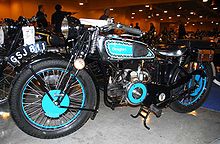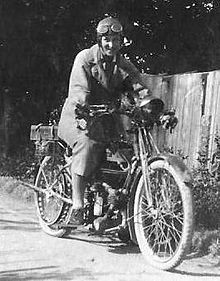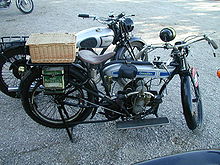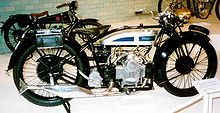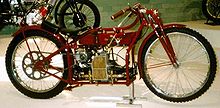- Douglas (motorcycles)
-
Douglas Industry motorcycle manufacture Fate bought by the Westinghouse Brake and Signal Company Ltd Founded 1907 Defunct 1957 Headquarters Kingswood, Bristol Key people William and Edward Douglas Douglas was a British motorcycle manufacturer from 1907–1957 based in Kingswood, Bristol, owned by the Douglas family, and especially known for its horizontally opposed twin cylinder engined bikes and as manufacturers of speedway machines. The company also built a range of cars between 1913 and 1922.
Contents
History
The brothers William and Edward Douglas founded the Douglas Engineering Company in Bristol in 1882. Initially doing blacksmith work, they progressed to foundry work and then acquired the flat twin design of W. J. Barter by taking over his company when it failed. Barter had founded Light Motors Ltd and produced his first single-cylinder motorcycle between 1902 and 1904; he had then produced a 200 cc horizontal twin called the Fair.
From 1907 a 350 cc Douglas version was on sale. In 1915 the engine was placed lengthways in the frame with belt final drive, and electric lighting. During World War I Douglas was a major motorcycle supplier, making around 70,000 motorcycles for military use.
In the 1920s Douglas built the first disc brakes, and had a Royal Warrant for the supply of motorcycles to the Princes, Albert and Henry.
Douglas motorcycles also became popular in dirt track racing. The 1923 RA model with disc brakes was favoured initially and this prompted Douglas to build specific dirt track models. These motorcycle designs were gradually increased in size and power with 500 cc and 600 cc engines fitted to the DT5 and DT6 Dirt Track models in the late 1920s and early 1930s. The engines had hemispherical heads and a short rigid forged crankshaft. They dominated dirt track racing for about three years. In 1929, the most successful dirt racing year, 1,200 Dirt Track motorcycles were sold.[1]
The Endeavour, a 494 cc shaft drive model came out in 1934. Like other companies of the time, they were struggling, and attempting to diversify into other modes of transport. In 1935 they were taken over by BAC, Bond Aircraft and Engineering Company.
Motorcycle production continued into World War II and was extended to generators. In 1948, not long after the war, Douglas was in difficulty again and reduced its output to the 350 cc flat twin models. The 1955 350 cc Douglas Dragonfly was the last model produced. The Westinghouse Brake and Signal Company Ltd bought Douglas out and production of Douglas Motorcycles ended in 1957.[2]
Douglas continued to import Vespa scooters into the UK and later imported and assembled Gilera motorcycles.
Douglas earned the greatest amount of notoriety in 1932–1933 when Robert Edison Fulton, Jr. became the first known man to circumnavigate the globe on a 6hp Douglass twin fit with automobile tires. Fulton went on to write a book on his adventure titled "One Man Caravan".
Douglas Cars
A version of Joseph Barter's horizontal twin cylinder engine of 1070 cc capacity, water cooled, was fitted to a two seat cyclecar in 1913. It was better equipped than the average cyclecar of the era featuring shaft drive from the front mounted engine to the rear wheels and was sold for £200. The rear suspension was unusual with a horizontal coil spring mounted above the differential, the front used a beam axle and semi-elliptic leaf springing.
Production was suspended during World War I and when the car re-appeared in 1919 the engine was enlarged to 1224 cc and the price had risen to £400 then to £500. This proved to be too expensive and sales dried up after a few hundred had been made. No original cars survive but a replica using some original parts has been made.
Motorcycle racing
 1926 magazine cover featuring a Douglas motorcycle in the Isle of Man TT
1926 magazine cover featuring a Douglas motorcycle in the Isle of Man TT
Douglas had some success in motorcycle racing and trials events. Twelve Douglas motorcycles were entered in both the Junior TT and Senior TT, and another three were in the Sidecar race during the 1923 TT. This gave Douglas their first senior Isle of Man TT victories. However Douglas had previously won the Junior TT in 1912. Tom Sheard won the 500 cc Senior TT[3] and they won the first ever Isle of Man Sidecar race with Freddie Dixon[4] while Jim Whalley had the fastest lap in the Senior TT with a time of just under 60 mph (97 km/h) during a wet race.[5] A Douglas also placed third in the Junior TT that year. Later in 1923 Jim Whalley won the French Grand Prix, a distance of 288 miles (463 km), and another Douglas won the 1923 Durban-Johannesberg Marathon race; a remarkable achievement by Percy Flook on a 2.75 hp machine with an average 43 mph (69 km/h) for 430 miles (690 km). 1923 also saw Jim Whalley win the Spanish 12-hour race and Alec Bennett won the 1923 Welsh TT race.[5].The late twenties saw success in Austria (1929 Austrian TT was won by Rudolph Runtsch) Post war the factory had little road racing success however a Mark 3 did win an outstanding victory in the 1950 Bemsee 'Silverstone Saturday' beating all the Velocettes, Nortons and BSA Gold Stars
Isle of Man TT
Douglas profile summaryFinishing Position 1 2 3 4 5 6 7 8 9 10 Number of times 4 2 3 4 3 4 5 2 3 1 Sources
- ^ Douglas History, Dropbears, http://www.dropbears.com/m/models/classic/douglas_motorcycles.htm, retrieved 10 October 2006
- ^ Roland Brown (November/December 2007). "1955 Douglas Dragonfly". Motorcycle Classics. http://www.motorcycleclassics.com/classic-british-motorcycles/1955-douglas-dragonfly.aspx. Retrieved 2011-10-03.
- ^ 1923 500 cc Senior TT results, Isle of Man TT official website, http://www.iomtt.com/TTDatabase/Races.aspx?meet_code=TT23&race_seq=4, retrieved 7 October 2006
- ^ 1923 Sidecar TT results, Isle of Man TT official website, http://www.iomtt.com/TTDatabase/Races.aspx?meet_code=TT23&race_seq=3, retrieved 7 October 2006
- ^ a b Douglas history and milestones, http://www.douglasmotorcycles.net/index.php/topic,1225.0.html, retrieved 7 October 2006
See also
- List of Douglas motorcycles
-
External links
British motorcycle manufacturers Manufacturing in the United Kingdom Current Defunct ABC (1919–1923) · Abingdon (AKD) (1903–1925) · Advance (1905–1947) · AER (1937–1940) · AJW (1928–1976) · AJS Motorcycles Ltd (1909-2000) · Ambassador (1946–1964) · Ariel (1902–1970) · Armstrong (1980–1987) · Ascot-Pullin (1928–1930) · AMC (1937–1966) · Baker (1927–1930) · Bat (1902–1926) · Baughan (1920–1936) · Beardmore Precision (1914–1930) · Blackburne (1913–1922) · Bradbury (1902–1924) · Brough (1908–1926) · Brough Superior (1919–1940) · BSA (1919–1972) · Calthorpe (1909–1939) · Chater-Lea (1900–1936) · Clyno (1909–1923) · Corgi (1946–1954) · Cotton (1918–1980) · Coventry-Eagle (1901–1939) · Coventry-Victor (1919–1936) · DMW (1945–1971) · DOT (1908–1978) · Douglas (1907–1957) · Dunelt (1919–1935) · Duzmo (1919–1923) · EMC (1947–1977) · Excelsior (1896–1964) · Francis-Barnett (1919–1966) · Greeves (1953–1976) · Haden (1912–1924) · Healey (1971–1977) · Hesketh (1981–1988) · Humber (1898–1930) · HRD (1922–1928) · Ivy (1911–1934) · James (1902–1966) · JAP (1903–1939) · Levis (1911–1939) · Martinsyde (1919–1923) · Matchless (1899–1966, 1988–90) · McEvoy (1926–1929) · Montgomery (1902–1939) · Ner-a-Car (1921–1926) · New Hudson (1903–1958) · New Imperial (1901–1939) · Norman (1935–1963) · Norton-Villiers (1966–1972) · Norton Villiers Triumph (1972–1978) · NUT (1912–1933) · OEC (1901–1954) · OK-Supreme (1882–1940) · P&P (1922–1930) · Premier (1908–1921) · Panther (1904–1967) · Quasar (1975–1982) · Quadrant (1901–1928) · Raleigh (1899–1967) · Rex-Acme (1899–1933) · Rickman (1960–1975) · Rover (1902–1924) · Royal Enfield (1893–1971) · Rudge (1911–1946) · Scott (1908–1965) · Silk (1976–1979) · Singer (1900–1915) · Sprite (1964–1974) · Sun (1911–1961) · Triumph (1885–1983) · Sunbeam (1912–1964) · Velocette (1904–1968) · Villiers (1898–1966) · Vincent-HRD (1928–1959) · Wilkinson (1911–1916) · Wooler (1909–1954) · Zenith (1905–1950)
Categories:- Motorcycle manufacturers of the United Kingdom
- Vintage vehicles
- Defunct motor vehicle manufacturers of the United Kingdom
- Cyclecars
- Scooter manufacturers
- Vehicles with boxer engines
- Companies based in Bristol
Wikimedia Foundation. 2010.

